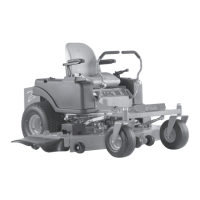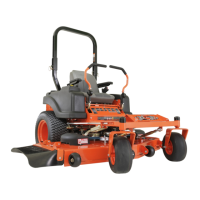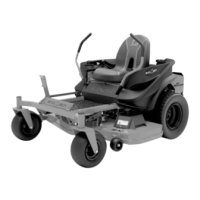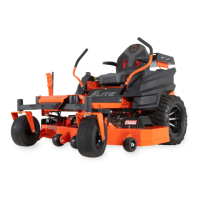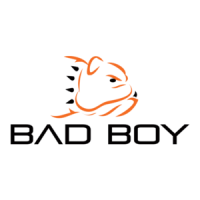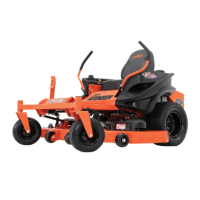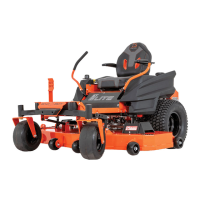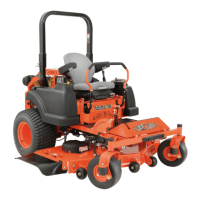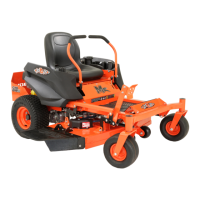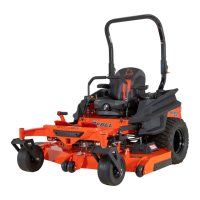Do you have a question about the Bad Boy ZT 2600 and is the answer not in the manual?
Process for validating the mower's warranty by completing and signing the registration form.
Location and importance of model and serial numbers for warranty and parts ordering.
Information on obtaining genuine Bad Boy replacement parts and authorized service.
Essential safety precautions to follow during operation and maintenance of the mower.
Guidance on understanding controls, practicing operation, and handling inclines/declines safely.
Daily checks for engine oil, air filter, tire pressure, and blade inspection.
Maintenance task for every 30 hours of usage: greasing the machine.
Maintenance tasks for every 50 hours: changing oil, filters, and hydraulic fluid.
Maintenance task for every 250 hours of usage: changing hydraulic fluid and filters.
Recommendations for storing the mower in a covered area and fuel handling.
Procedures for securely loading and transporting the mower on a trailer.
Tips to diagnose and fix an uneven cutting pattern and improve cut quality.
Troubleshooting steps for a mower that fails to start, checking battery, fuel, and spark plug.
Steps to troubleshoot why the mower blades are not engaging when activated.
Recommended fuel type and octane rating for the mower's engine.
Description of the three-position ignition switch (off, run, start) and its operation.
Explanation of the throttle control lever for adjusting engine RPM.
How to use the choke control lever for starting the engine.
Explanation of how the control levers (drive arms) manage speed, direction, and steering.
How to use the switch to engage and disengage the mower blades.
Operation of the deck lift control to raise and lower the mower deck.
Instructions on how to safely load an inoperable mower onto a trailer using a winch.
How to engage the neutral position on ZT models using the neutral bypass levers.
Information on the weight range of the Bad Boy ZT Series mowers.
Explanation of the electronic hour meter and its function in recording engine run time.
Guidelines for checking, sharpening, handling, and maintaining mower blades safely.
Procedure for greasing bearings, including grease type, fitting cleaning, and application.
Description of standard mowing blades (2-in-1) designed for cutting and discharging clippings.
Description of mulching blades (3-in-1) designed for mulching, discharging, and bagging.
Advice on selecting blades for desired cutting performance and considerations for aftermarket blades.
Location and type of oil for the hydro overflow tank and system.
Procedure for servicing sealed transaxle units, including filter replacement and oil changes.
Method for filling the hydro system via check plugs and the hydro overflow tank.
Procedure for bleeding air from the hydro system after filling with oil, using bypass levers.
Location and adjustment of the pump belt tensioner for proper belt tension.
Recommendations for engine oil type, capacity, and recommended change intervals.
Location and replacement procedure for the fuel filter.
Procedure for inspecting and cleaning the air cleaner, with emphasis on dusty conditions.
Recommended torque specification for the clutch bolt and re-torquing advice.
Location of the 25 amp main fuse on different mower models.
Checking the condition and connection of the wiring harness ground cable.
Checking the condition and connection of relays located under the seat.
How to check the charging wire voltage from the alternator at full throttle.
Torque specification for the front fork castle nut and proper installation of the cotter pin.
Torque specification for rear wheel lugs and re-torquing advice.
Greasing points for front wheel and front caster bearing housings.
Greasing points for actuator bar pillow blocks located under the fuel tanks.
Greasing the pivot point of the pump belt tensioner.
Greasing the pivot point of the deck belt tensioner.
Greasing points for the control arm blocks.
Procedure for removing the deck belt and checking/adjusting deck level.
Adjusting deck pitch using turnbuckles and setting critical deck spring tension.
Importance of blade condition, replacement, and safe blade changing procedures.
Tips on mowing patterns, grass height, avoiding scalping, and mowing conditions.
Guidance on mowing frequency, grass clipping decomposition, and thatch buildup.
Importance of sharp blades and using fuel stabilizer for seasonal storage.
Visual examples of leaf blade conditions after mowing with sharp and dull blades.
Information on the benefits of grass clippings and advice on bagging vs. mulching.
List and identification of parts related to the seat assembly, including safety switches.
List and identification of parts related to the fuel tanks and fuel gauge.
Identification of ignition, PTO engager, deck lift, brake, choke, and throttle components.
Identification of left and right axles, and tire and wheel assemblies.
Identification of transaxle spacers, crossover brake bracket, and transaxle support.
Identification of brake cable, fittings, and transaxle filter.
Identification of tire and wheel assemblies, tires, and wheel nuts.
Identification of bearings, seals, races, dust covers, wheel spacers, and spindle assembly.
Identification of bolts, nuts, and castle nuts used in the front wheel and spindle assembly.
Identification of the actuator bar, deck hanger assembly, and associated hardware.
Identification of spring tensioner, idler springs, pulleys, and brackets for belt tensioning.
Identification of bushings, bolts, nuts, spacers, and washers for the assembly.
Identification of the 50" deck belt and fusion blades.
Identification of the deck itself, anti-scalp rollers, and deck wheel assemblies.
Identification of spindles, spindle covers, and various pulleys used on the deck.
Identification of discharge chute hanger, turnbuckles, deck hanger chain assembly, and springs.
Identification of the 60" ZT/CZT deck belt and fusion blades.
Identification of the 60" deck, anti-scalp rollers, and deck wheel assemblies.
Identification of spindles, spindle covers, and various pulleys used on the deck.
Identification of discharge chute hangers, turnbuckles, deck hanger chain assembly, and springs.
Identification of the left and right drive levers.
Identification of drive arm lever housings, bushings, and washers.
Identification of springs, ball joints, and drive rods for the drive lever system.
Identification of the electric safety switch and its mounting bracket.
Identification of battery holder, wing nuts, bolts, and washers.
Identification of seat springs, bumpers, actuator, and quick release ball joint.
Identification of hydraulic tank, cap, solenoid, and drive rods.
Identification of the Briggs Intek engine, clutch, pulleys, oil filter, air filter, and fuel filter.
Identification of the 26 HP exhaust and extension.
Identification of hex nuts, lock washers, bolts, and the oil drain valve.
Identification of the 27HP Kohler Courage engine, clutch, and clutch pigtail.
Identification of Kohler oil filter, fuel filter, and air filter.
Identification of engine bolts, keyed shaft, pulley, and exhaust components.
| Brand | Bad Boy |
|---|---|
| Model | ZT 2600 |
| Category | Lawn Mower |
| Language | English |
